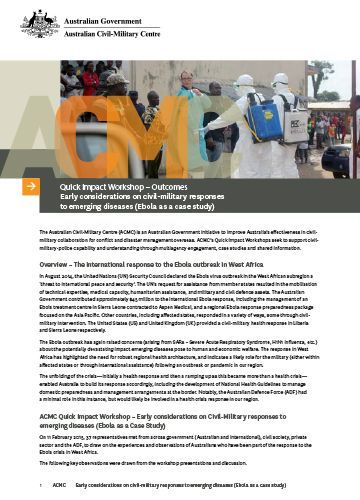In August 2014, the United Nations (UN) Security Council declared the Ebola virus outbreak in the West African subregion a ‘threat to international peace and security’. The UN’s request for assistance from member states resulted in the mobilisation of technical expertise, medical capacity, humanitarian assistance, and military and civil defence assets. The Australian Government contributed approximately $45 million to the international Ebola response, including the management of an Ebola treatment centre in Sierra Leone contracted to Aspen Medical, and a regional Ebola response preparedness package focused on the Asia Pacific. Other countries, including affected states, responded in a variety of ways, some through civilmilitary intervention. The United States (US) and United Kingdom (UK) provided a civil-military health response in Liberia and Sierra Leone respectively.
The Ebola outbreak has again raised concerns (arising from SARs – Severe Acute Respiratory Syndrome, H1N1 influenza, etc.) about the potentially devastating impact emerging diseases pose to human and economic welfare. The response in West Africa has highlighted the need for robust regional health architecture, and indicates a likely role for the military (either within affected states or through international assistance) following an outbreak or pandemic in our region.
The unfolding of the crisis—initially a health response and then a ramping up as this became more than a health crisis— enabled Australia to build its response accordingly, including the development of National Health Guidelines to manage domestic preparedness and management arrangements at the border. Notably, the Australian Defence Force (ADF) had a minimal role in this instance, but would likely be involved in a health crisis response in our region.


